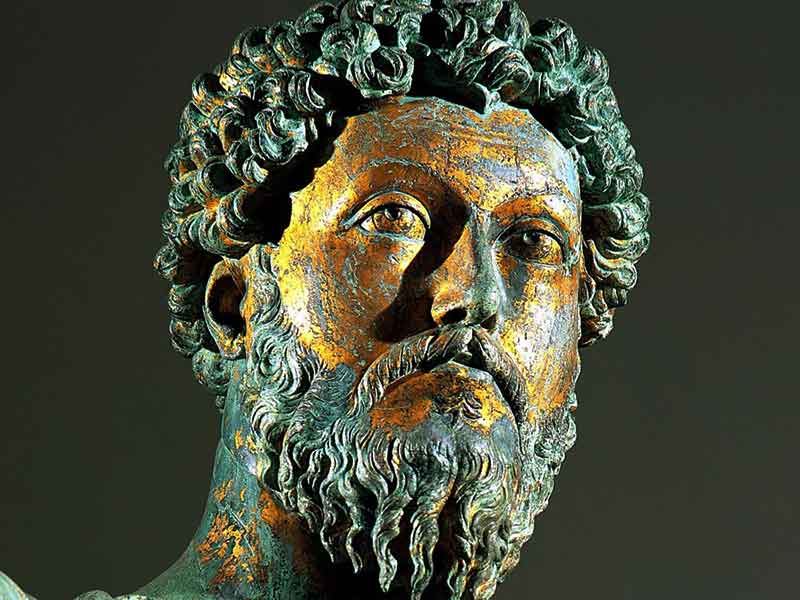Proud to introduce to you Emperor Marcus Aurelius
Emperor Marcus Aurelius
Marcus Aurelius, born Marcus Annius Verus, was a prominent Roman emperor who ruled from 161 to 180 AD. Renowned both for his effective leadership during turbulent times and his profound philosophical work, he remains one of the most respected figures in Roman history.
Birth
26 April 121 AD, Rome, Italy
Death
17 March 180 AD, Sirmium
Known for
His book "Meditations"
Successful Defensive Wars
Marcus Aurelius skillfully led a series of defensive military campaigns that preserved the stability of the vast Roman Empire. Notably, he confronted and defeated several Germanic tribes including the Marcomanni, Quadi, and Sarmatians. These wars, fought primarily along the empire’s northern frontiers, were critical in maintaining Roman territorial integrity and preventing invasions during a period of significant geopolitical pressure. His military leadership demonstrated resilience, strategic acumen, and commitment to securing the empire’s borders despite ongoing external threats.
Imperial Administration
Beyond the battlefield, Marcus Aurelius was deeply involved in the governance and administration of the empire. He focused on enhancing the efficiency of the imperial bureaucracy and instituted important legal reforms aimed at promoting justice and fairness. His policies sought to reduce corruption among officials and improve the welfare of Roman citizens, reflecting his Stoic ideals of duty and virtue. Marcus emphasized accessibility in the legal system, ensuring that even the lower classes could seek redress, which helped to stabilize Roman society during his reign.
Philosophical Legacy
Marcus Aurelius is perhaps best remembered for his enduring philosophical work, Meditations. Originally written as personal reflections to guide his own conduct, these writings have transcended time to become a foundational text in Stoic philosophy. Meditations explores themes of self-discipline, rationality, and acceptance of fate, offering profound insights into human nature and the practice of virtue. His philosophical legacy continues to inspire individuals around the world in the realms of leadership, ethics, and personal growth.
Leadership during Challenging Times
Marcus Aurelius’ reign was marked by significant crises, including the devastating Antonine Plague, which severely impacted the population and economy of the empire. Despite these hardships, he displayed remarkable leadership by prioritizing public health measures and providing aid to suffering communities. His ability to maintain relative stability, both politically and socially, during such tumultuous times highlights his compassionate and stoic approach to governance.
Legacy of Wisdom
The timeless wisdom contained in Marcus Aurelius’ Meditations has made him a symbol of resilience, inner peace, and practical philosophy. His reflections on confronting adversity and maintaining moral integrity continue to influence leaders, philosophers, and scholars worldwide. His legacy embodies the ideal of ruling with wisdom and humanity, qualities that define his reputation as the philosopher-king.
Role in the Spread of Christianity
The role of Marcus Aurelius in the spread and treatment of Christianity during his reign remains a subject of historical debate. While persecution of Christians did increase during this time, there is no clear evidence that Marcus Aurelius personally initiated or directed these actions. The heightened repression was often enforced by local officials rather than by explicit imperial decree.
His Stoic philosophy emphasized virtue, duty, and respect for traditional Roman religious practices, which he regarded as essential for social order and stability. This emphasis may have indirectly influenced a less tolerant stance towards emerging religions like Christianity that challenged established traditions. Nonetheless, Marcus Aurelius’ approach seems to have been more about maintaining civic unity than targeting any faith specifically.
Emperor Marcus Aurelius Summary
Despite facing external invasions, a deadly plague, and internal pressures, Marcus Aurelius left an enduring legacy as both a capable emperor and a wise philosopher. His dedication to duty, commitment to justice, and profound philosophical insights have cemented his status not only in Roman history but also as an inspirational figure across the ages. His life exemplifies the balance between power and wisdom, making him a timeless role model for leadership and ethical reflection.

Content created by:
Alex Costin
Results driven services:
Digital Marketing
Need my expertise?
Contact me
No tracking cookies!
General information purposes only!
Business partners offers (backlinks):
Search Engine Optimisation agency:
SEO
Explore this city secret guide:
Barcelona
Outdoor recreational activity:
Canyoning
Wide range of financial services:
Chartered Accountant
Copyright © 2023-2025 Alex Costin